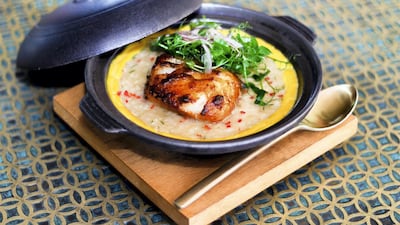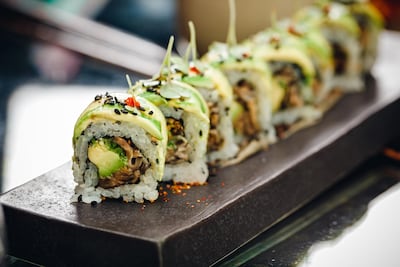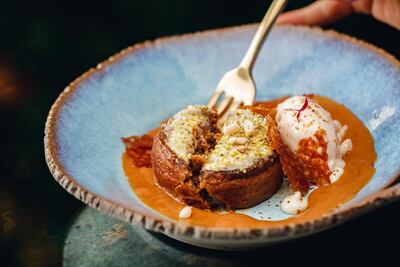The fine-dining Peruvian restaurant, located on Al Maryah Island in Abu Dhabi and Jumeirah Beach Road in Dubai, is serving a four-course iftar during Ramadan, including one soup, six starters, one main course and a dessert, preceded by fast-breakers such as dates, edamame and fresh juice.
What to expect and where to sit
Every nook and cranny that does not directly bar your walk to and from your table is packed with potted plants, artistic figurines, and distressed wood and embellished cabinets. Coupled with the mood lighting at the Abu Dhabi branch we visit, the overarching vibe is classy and cosy.
Unless there’s a sea breeze, it’s going to be too hot to sit on the terrace – instead, choose a seat beside the floor-to-ceiling windows that overlook the water. A couple of two-person couches are also available for more privacy, while a 14-seater dining room can be booked for family gatherings.
The menu
Most iftar menus begin with a serving of dates, but the platter of Sukkari dates at Coya is also accompanied by a date-infused tea and lightly salted edamame. I promptly scald my tongue on the piping hot but super-refreshing syrup – fortunately, my taste buds recover in time for the soup and starters.
Diners can choose from three soups – one delicate, one tangy and one hearty. I get the light but buttery pumpkin soup served with crunchy bits of veal bacon and pumpkin seeds, while my dining partner opts for the piquant tomato infused with rocoto peppers and goat's cheese. Fast-breakers could consider the third option: a rich Peruvian bean broth with bonito flakes, but remember there's plenty more to come.
The six starters include fresh and crunchy mushroom and avocado maki rolls; a chicken taco; a Wagyu slider; sea bass croquettes; a mushroom anticucho; and a trio of grilled, crispy and jumbo corn. The portions are small, but pack a solid flavour punch. The miniature chicken taco, for example, comes with bell pepper, huayro potato and botija olive, and each makes itself known with a flair not found in most run-of the-mill Tex-Mex joints.
The mushroom skewer is the spiciest of the lot, drenched as it is with aji panca (Peruvian red pepper) paste, while the chilli mayo-drizzled croquettes have a bite to them, too. I could have done with a bit more lime sauce with the crunchy corn kernels, but that’s easy enough to add.
Mains have a pea, bean, tomato and goat's cheese stew for vegetarians, while the other options include baby chicken, salmon, beef ribs and Chilean sea bass (more on these below). Fittingly, the meal also ends with a Sukkari date cake with banana ice cream, its sweetness offset by passion fruit and sprinkled with crunchy puffed rice flakes.
Standout dish
Among the 12 served on this iftar, the Wagyu bocaillo is my favourite. Don't let the diminutive size of this lone slider fool you – it looks tiny, but is made up of bold, hearty flavours. It takes me four bites to finish, and each yields a mouthful of tender meat, a cooked quail egg and Manchego cheese packed between a buttery brioche.
If I could, I would request another in lieu of the Chilean sea bass croquettes, which were a bit too fried and fishy for my taste.
A chat with the chef
Malaysian chef Pang, a former electronics engineer, worked his way up to sous chef at the Swissotel in Singapore, where he spent close to 10 years. A chance meeting with the Coya Dubai chefs led to an offer that saw him opening the Abu Dhabi kitchen two years ago. Pang originally trained in the French style, with a bit of Asian and Scandinavian knowledge thrown in, and retrained to familiarise himself with every aspect of Peruvian cooking.
“It’s influenced by Japanese, Chinese and Spanish cuisines, with the latter giving Peru its limes, lemons and beef. Before that, it was only about the passion fruit, seafood and chicken,” says Pang. Coya’s signature dish, Arroz Nikkei (Chilean sea bass with seaweed stock and bomba rice), melds all these influences, and is one of the chef’s recommendations. His second must-have dish is Costilla de Res (beef ribs with miso and lemon-flavoured pepper).
Both of these are main-course options on the iftar menu, and stand out for their flavour combinations – the sea bass, particularly, is a delicious mix of soft, sweet, crumbly fillet and piquant lime-and-chilli-infused rice.
The Wagyu, meanwhile, says the chef, is cured overnight so the salt can penetrate the meat. It's then smoked over a water bath at 68 degrees to slow-cook for 16 hours (the resultant, melt-in-the-mouth texture is delightful). "The glaze uses both white and brown chicken stock, one for its colour, the other for its flavour," explains Pang.
Value for money and contact information
Given that the Arroz Nikkei itself is Dh215 on the a la carte menu, the dozen dishes served at this iftar are well worth the Dh199 (Abu Dhabi) and Dh250 (Dubai) price tag.
The one grouse I have with this, and most other iftar menus, is that it’s served only until 8.30pm, and you can’t come back to it after, giving you just over 90 minutes to finish all the courses. I’d have liked a little more time to savour my meal, although the small starter portions and fresh, simple flavours ensure this one doesn’t leave you feeling overstuffed.
Call Coya Abu Dhabi on 02 306 7000 and Coya Dubai on 04 316 9600.
This review was conducted at the invitation of the restaurant






